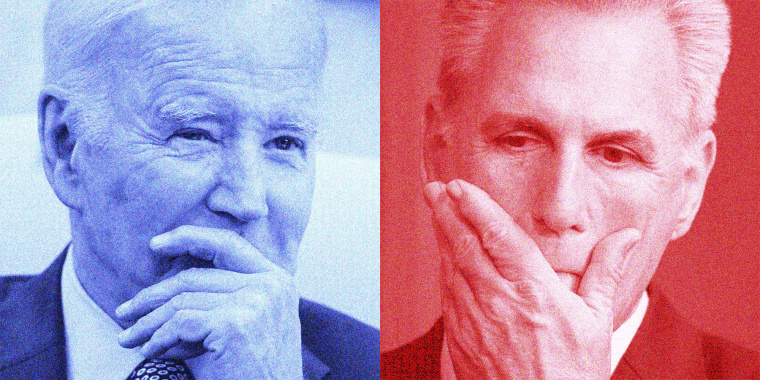WASHINGTON — The Republican-controlled House is poised to vote Wednesday on the debt ceiling legislation negotiated by Speaker Kevin McCarthy and President Joe Biden, a high-stakes moment for the bill aimed at averting a disastrous default.
Although the McCarthy-Biden deal has faced heavy criticism from GOP hard–liners who argued that its spending cuts and conservative provisions are too weak, the House Rules Committee voted 7-6 to send the measure to the floor Tuesday night, a key signal of support ahead of Wednesday’s vote.
“I’m confident we’ll pass the bill,” McCarthy, R-Calif., told reporters Tuesday.
First, the full House will vote on the “rule,” which is expected on Wednesday afternoon. Although the majority party typically carries procedural votes like these by itself, this will likely require some Democratic support. If the rule passes with a majority of the chamber, the House will briefly debate and then vote on the legislation later in the evening. The exact timing is fluid.
If the bill passes the House, it would go to the Democratic-led Senate, where it would need 60 votes before it could get to Biden’s desk. Senate Majority Leader Chuck Schumer, D-N.Y., and Minority Leader Mitch McConnell, R-Ky., have both endorsed it.

The White House has urged speedy passage of the measure as the U.S. nears Monday’s deadline to address the debt ceiling or risk an economically catastrophic default on the nation’s debt. The deal includes a two-year debt limit extension paired with a two-year budget deal containing modest spending cuts.
House Republican leaders expect to lose some votes, mostly from hard-right members who say the deal isn’t aggressive enough at delivering spending cuts to gain their approval. That means some Democrats will be needed to get it over the finish line, although Democratic leaders say the onus is primarily on Republicans.
“My expectation is House Republicans will keep their commitment to produce at least two-thirds of their conference, which is approximately 150 votes,” House Minority Leader Hakeem Jeffries, D-N.Y., told reporters Tuesday. “Democrats are committed to making sure that we do our part and avoid the default.”
Jeffries wouldn’t say how many Democrats would vote for the rule or the legislation, but he said he’s confident the country will extend the debt ceiling in time.
McCarthy said he hasn’t spoken to Jeffries about how many Democratic votes he’ll need, but he said he expects Wednesday’s final vote to be bipartisan.
“Any time there’s an agreement with two parties, there’s always two parties who vote for it at the end,” McCarthy said.
Rep. Don Bacon, R-Neb., said he’s “a yes vote” and predicted that “a supermajority” of House GOP members would support the bill. “It’s a reasonably good bill, and it’s responsible,” he said.
“Our only rule was the majority of the majority” would need to support any bill for McCarthy to bring it to the floor, Bacon said. He added it will get “a lot more than just half” the conference.
The legislation would cap spending for the next two years. It includes conservative measures that would claw back about $28 billion in unspent Covid relief funds, eliminate $1.4 billion in IRS funding and shift roughly $20 billion of the $80 billion the IRS got through the Inflation Reduction Act to nondefense funding.
The bill would also restart federal student loan payments after a lengthy pause that began at the start of the pandemic. And it would add work requirements for people up to 55 years old to get benefits under the Supplemental Nutrition Assistance Program and Temporary Assistance for Needy Families (the current threshold is 50 years old), with carve-outs for veterans and homeless people.
An analysis by the nonpartisan Congressional Budget Office found that if the bill’s spending caps and targets are followed, it would reduce federal discretionary spending by $1.3 trillion over the next 10 years. Only the first two years of spending levels are binding under the legislation, however.
The SNAP reforms would actually net out a spending increase of $2.1 billion, CBO found. The new work requirements would save $6.5 billion, but the new exclusions for homeless people and veterans would add 78,000 new people to SNAP benefit rolls and cost $8.6 billion.
Hard-right members tore into the measure.
Rep. Dan Bishop, R-N.C., said the conservative policy provisions were actually “fictionalized suggestions of change” that are insignificant. “In effect what they’ve done” is a “clean” debt limit extension with no substantive policy additions, he argued, portraying it as a surrender to Biden’s demands.
“And so there’s nothing there,” said Bishop, who also took issue with the agreement’s provision to extend the debt ceiling for a full two years through the next presidential election. “If you’re going to do tacitly a clean debt ceiling, make it short.”
If the debt limit bill passes the House, individual senators who oppose it, like Mike Lee, R-Utah, have procedural tools they could use to try and slow it down past Monday’s deadline. Schumer has encouraged members to act quickly to avoid default.
“Senators should be prepared to move on this bill quickly once it is the Senate’s turn to act. I cannot stress enough that we have no margin — no margin — for error,” Schumer said Wednesday, warning that “any needless delay, any last-minute brinkmanship” could mean that “the federal government will default for the first time ever.”






















